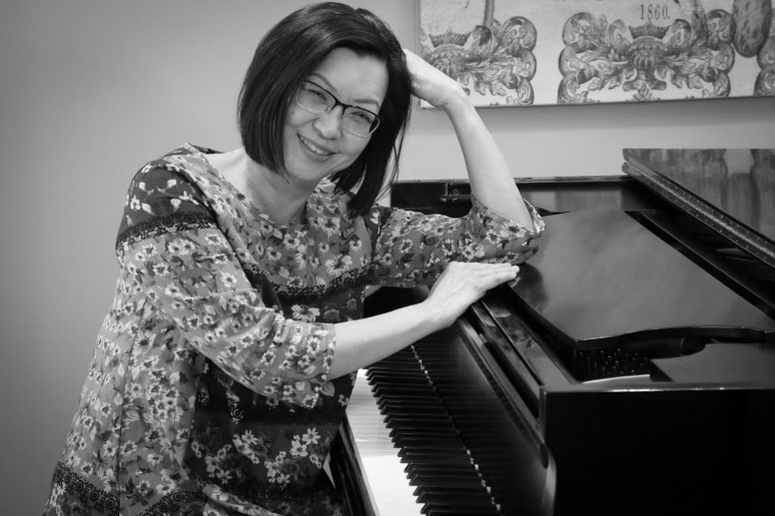
BIOGRAPHY

Chee-Hwa Tan, composer and pianist-educator, is passionate about mentoring the next generation of musicians and supporters of the Arts. She has served as the Head of Piano Pedagogy at the University of Denver Lamont School of Music, and on the piano pedagogy faculties at the Oberlin Conservatory and Southern Methodist University. During her tenure at DU, she created the Lamont Piano Preparatory Program, a cutting-edge, 21st century teaching laboratory for the innovative teaching of group and private piano study for adults and children. As a composer, Chee-Hwa explores the tonal colors of the instrument while encouraging performers of all ages to connect at an emotional and intellectual level of understanding. Her landmark work, A Child’s Garden of Verses – a collection of tone-poem etudes for solo piano – has for decades empowered musicians young and old to discover their artistic voices through the synthesis of technique, literature, and sound.
Chee-Hwa’s solo piano music is published by Piano Safari; with selections included in the Repertoire and Study syllabi of the Royal Conservatory of Music, Canada, the Associated Board of the Royal Schools of Music, London, and the London College of Music. Her publishing company Dayung Sampan Music expands her philosophy of music making and artistry to other instrumental combinations at all levels. A native of Malaysia and a naturalized U.S. citizen, Chee-Hwa holds Masters’ degrees in Piano Performance and Piano Pedagogy from the Southern Methodist University and a B.A. in Piano Performance and English from Oral Roberts University. Her teachers and mentors include Alfred Mouledous, Joaquin Achucarro, Dr. E. Gregory Nagode, Dr. David Karp, and Joyce Bridgman.

A Personal Note from Chee-Hwa:
As a composer, I desire to write music that celebrates beauty and emotion in its many manifestations. My underlying goal is to strive to create music that maximizes one’s ability to communicate with an artistic, personal voice. Artistry is that which moves the heart towards beauty and something higher than us – this holds true for the one who receives as well as for the one who gives.
I work to create music that makes an artistic voice accessible and inspiring for all to attain. I do this because I believe beauty in artistry is to be experienced not only by those who are advanced, but also by those who are developing musicians. For me, being able to communicate with artistry is the “magic” of music. In the arts, this defining element is what can bring healing to emotions and impact hearts. I strongly believe that everyone can experience beauty and that everyone can experience, even a little, of what it is to be an artist. We are not limited to the voices or culture around us.
Studying piano as a little girl in Malaysia, I recall falling in love with how I could express my emotions through the colors and sounds of the instrument. Music, like books, freed me to explore the world of the imagination and story. My heart yearned to be immersed in the communication and transmission of this mystery called music.
“I’ll be a composer!” was my first thought.
Unfortunately, the only music I knew was by male composers like Bach, Beethoven, Mozart, and Chopin. My conclusion: “Women must not be very good composers…” In addition, I thought a composer had to have been dead for at least fifty years to be considered a “real” composer. Plus, they obviously had to be of European heritage. The chips were clearly stacked against me…
I considered being an orchestra director. Alas, from my limited knowledge of famous conductors, it seemed that men were better at waving their hands frantically in front of a group of musicians as well.
Ever pragmatic, I finally concluded “I guess I’ll just have to be a pianist…”
Fast forward many years later and I have since made an amazing discovery – the ability to make beautiful music is not limited to gender, ethnicity, or to persons who are no longer living.
I share this personal story to illustrate that we should not define ourselves by our limitations. In fact, I am now convinced that the act of creating music is more of a democracy; it is for everyone to experience. It is not just limited to the “professionals.” Seriously, where would we be today if music were dependent on only experts?
Everyone can and should experiment with creating, at least a little, in some shape or form. Why? Because to engage in creating is to connect to our own “humanness” – a reflection that we are part of something larger than ourselves – imperfect, but still beautifully and wonderfully made.
So often, in areas of the arts like music, we spend so much time judging ourselves and others that we get stuck in “consumer” mode and lose our capacity for delight. When we create, it ignites curiosity. To be fully curious, is to momentarily suspend judgment.
Remember our love of play as children? When we engage in creative play – even at beginner levels – we exchange our role as a consumer for that of a creator. In setting aside our internal judges, we rediscover our capacity for delight.
This is my goal: to compose music that delights and engages the performer as a co-creator through the power of storytelling. I want to make it accessible for each one to communicate and process emotion through sound and the power of imagination. My wish for those who play my music is that they tell their stories in their own musical voice. And may we all be surprised by joy in this journey of life and music making.
“The Land of Story Books” by Chee-Hwa Tan
Watch.



